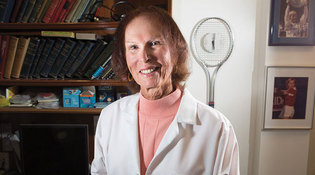 loading
loading
Where They Are NowTrans pioneer and eye surgeonRénee Richards ’55 made national headlines for becoming a woman—forty years before Caitlyn Jenner.  Julie BrownRenée Richards ’55, an early standard bearer for transgender athletes, made headlines when she sued to play tennis as a woman. View full imageWhen Dr. Renée Richards ’55 attended an all-male Yale, she was captain of the Yale men’s tennis team. Her later attempt to quietly begin living life as a woman was derailed when the lethal lefty serve of the former Richard Raskind was recognized. She sued and—in a landmark 1977 decision by the New York Supreme Court—won the right to play professional tennis as a woman, which she went on to do, reaching the doubles final in the 1977 US Open. Her most recent book is Spy Night and Other Memories: A Collection of Stories from Dick and Renée. Y: This interview is to get an update on where you are now. R: I can tell you where I was in June . . . Y: Where were you in June? R: I was in New Haven for my 60th! It was something I wasn’t sure I wanted to do: big groups are not for me. But one of my classmates was e-mailing, and I said, “Give me one reason I should go.” And he said, “Because you can.” And I said, “You know, that’s a very good reason.” It’s probably the last one for almost all of us, I would think. I just had a great time. It was corny but I just thought how lucky I was to have gone to a college like Yale. Y: How do you want to be remembered? R: I’m known for being this pioneer in the transgender community. I was really the standard bearer. And that’s my legacy as far as the public is concerned. But as I write in my new book Spy Night, that was only a part of my life—a significant part—but the major thrust of my life has been being an eye surgeon for 55 years. Y: Have you retired from surgery? R: The last chapter in Spy Night is called “Last Day for Dr. Renée,” and it describes my last day in the operating room. I figured, turning 80, that’s operating long enough. But I still see patients. Y: Is there anything you’d like young transgender people today to know about your experience? R: I would like them to know the public sounding of the horn that’s done nowadays was unheard of in my time. If someone was about to embark on a “sex change”—a “transition” is what they call it now; we didn’t have that word then—it was done in secrecy. I changed my name, I moved 3,000 miles away, I got a job in my profession working in my new identity in my new name, and I hid my previous life from as many people as possible. (My close friends and family all knew.) We did what was called “woodworking”: we merged into the woodwork. It was more like going into the witness protection program. Now look at Caitlyn Jenner—it’s the day-to-day update. Y: What’s an average day like for you? R: Today I got up early and I went to my Westchester office. I saw about a dozen kids with various eye problems. And then I came back here to check on the dogs. And then I’m going to go over and play some golf. Y: What’s your handicap? R: My handicap at one time was under 10, but it isn’t anymore. Right now it’s gone up to 17. I’m showing my age on the golf course. A number of the women in Ladies League outdrive me, which is pretty hard for me to take, but I accept it because I have to. I try to make up for it with good chipping and putting and course management. So I stay competitive.
The comment period has expired.
|
|